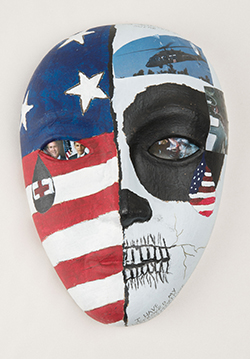Healing Through Art Therapy: Science Café Speaker To Focus On Treatment To Process Feelings, Experiences
By Shannon Sarino
National Museum of Health and Medicine
At the National Intrepid Center of Excellence (NICoE) at Walter Reed National Military Medical Center, service members work with a team of providers to develop treatment plans for traumatic brain injury (TBI) and psychological health conditions, including post-traumatic stress disorder (PTSD).
On August 30, Science Café attendees will hear from Melissa Walker, a credentialed art therapist who works with service members to artistically help and process their feelings, experiences, and identities. Walker will also discuss the program structure at NICoE, and offer examples of therapeutic outcomes through service member artwork and anecdotes. Research outcomes will also be presented on the thematic analysis the NICoE and Drexel University recently conducted on almost 400 of the masks.
A selection of masks from this unique program will be on display at the National Museum of Health and Medicine (NMHM) from August 12 to September 23. They were created in art therapy sessions by military service members at NICoE, as a conduit to artistically externalize and then process their feelings, experiences, and identities with the psychotherapeutic guidance of credentialed art therapists. The masks are grouped into three themes: the split sense of self/duality, patriotism, and the injury with reference to psychological and physical pain.
"The art therapists at the NICoE have meaningful interactions with the service members each and every day," Walker said. "One of my long-term patients has been using art therapy to work through difficult memories for over two years now. Initially, he was able to express an image that haunted him for seven years in a mask and afterwards his flashbacks of that particular image ceased. He has continued to paint whenever something is bothering him, and each time he verbalizes that the process helps him work through the content and take control of it."
The most rewarding part of the experience, she added, is the positive change that occurs in the service members during the four-week program.
"We see their affects change, as well as their ability to be open with their providers, families, and each other," she said. "During art therapy, they are able to express invisible wounds through their artwork, and I believe this validates their experiences and helps others to better understand what they are going through. The art therapy gives service members who perhaps don't have the words, a visual voice."
The August Medical Museum Science Café – "Unmasking the Trauma" – will be held August 30, from 6 to 7 p.m., at NMHM, 2500 Linden Lane, Silver Spring, Maryland. NMHM's Medical Museum Science Cafes are a regular series of informal talks that connect the mission of the Department of Defense museum with the public. NMHM was founded as the Army Medical Museum in 1862 and moved to its current location in Silver Spring, Maryland, in 2012. NMHM is an element of the Defense Health Agency. For more information on upcoming events, please call 301-319-3303 or visit www.medicalmuseum.mil.

|
Caption:
An Army flight medic. The mask represents our country shedding tears for our military on one side, and our military
shedding tears for our country on the other side. Quotes on the military side (which also symbolizes death via the skull) read,
"Shed no more tears, your medic will shed them for you," and "I have destroyed my life and myself so that others may live."
Mask by a military service member from art therapy sessions at the National Intrepid Center of Excellence, Walter Reed National
Military Medical Center. Temporary exhibit of art therapy masks on display at National Museum of Health and Medicine,
Silver Spring, Md. in Aug-Sept. 2016. (National Museum of Health and Medicine photo by Matthew Breitbart/ Released) |



